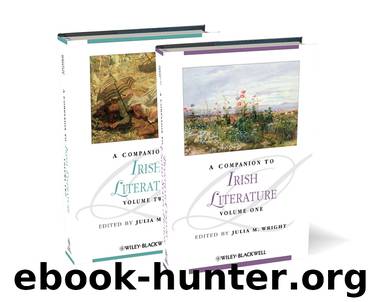A Companion to Irish Literature by Wright Julia M.; Wright Julia M.;

Author:Wright, Julia M.; Wright, Julia M.;
Language: eng
Format: epub
Publisher: John Wiley & Sons, Incorporated
Published: 2011-07-06T16:00:00+00:00
29
Oscar Wilde’s Convictions, Speciesism, and the Pain of Individualism
Dennis Denisoff
In 1895 journalist W.T. Stead published “The Conviction of Oscar Wilde,” a response to Wilde’s arrest for “gross indecency.” In the article, Stead proposes that Wilde’s homosexual desires are, contrary to common argument, quite natural, albeit only for somebody who is abnormal. “If the promptings of our animal nature are to be the only guide,” Stead explains, “the punishment of Oscar Wilde would savour of persecution, and he might fairly claim our sympathy as the champion of individualism against the tyranny of an intolerant majority” (Stead 1895:491). Stead goes on to argue, however, that humans are distinct from other animals because they are part of a society working to make “social intercourse as free and happy as possible,” while other animals, assumedly, are not.
Stead’s intention with this piece is not to address nonhuman species. Just as Wilde, throughout his career, took advantage of promotional possibilities offered by the periodical industry (Gagnier 1986), press writers such as Stead were quick to use Wilde’s notoriety to bring attention to concerns other than those that interested Wilde – such as his writing, aestheticism, his Irish heritage (see de Nie 2004), or same-sex desire (see Cohen 1993). Stead’s own purpose here is to point out the comparatively minor punishment doled out to men who sexually abuse girls as opposed to those such as Wilde who abuse boys (see Stead 1895). Another aim is to criticize his society’s hypocrisy in condemning Wilde while still offering a “tacit universal acquiescence” (Stead 1895:492) to homosexual acts at British public schools, not to mention the Oxbridge communities of which Wilde himself had been a member (see Dowling 1994). As Stead goes on to argue, “[i]f all persons guilty of Oscar Wilde’s offences were to be clapped into gaol, there would be a very surprising exodus from Eton and Harrow, Rugby and Winchester, to Pentonville and Holloway” (Stead 1895:492). With this image of mass incarceration, Stead undermines his initial depiction of Wilde’s sexual proclivities as rare, suggesting that a large number of males would land in prison if the law were fully applied. More importantly, he also contradicts his perception of society’s view on laws and punishment, emphasizing the fact that there exists extensive public awareness, indeed acceptance, of homosexual practice in public schools. There is, in short, a discrepancy between Stead’s description of his society’s actual values and what he declares they must be.
But why did this journalist, in order to establish his personal views as fundamental, raise the issue of animal rights by suggesting a synthesis of homosexuals and nonhuman animals? In Stead’s conception, both function as marginal groups that demarcate an inadequate morality from which exclusively human ethics can be clearly distinguished. For Stead, other species, like homosexuals, help emphasize that human ethics are not simply a product of nature, but the result of a collective worldview maintained through a system of regulation and punishment. Stead shows no sense of awareness of the biases behind his formulation,
Download
This site does not store any files on its server. We only index and link to content provided by other sites. Please contact the content providers to delete copyright contents if any and email us, we'll remove relevant links or contents immediately.
Still Me by Jojo Moyes(11266)
On the Yard (New York Review Books Classics) by Braly Malcolm(5525)
A Year in the Merde by Stephen Clarke(5431)
Eleanor Oliphant Is Completely Fine by Gail Honeyman(5282)
The Bookshop by Penelope Fitzgerald(3854)
How Music Works by David Byrne(3272)
Surprise Me by Kinsella Sophie(3114)
Pharaoh by Wilbur Smith(2993)
Why I Write by George Orwell(2955)
A Column of Fire by Ken Follett(2614)
Churchill by Paul Johnson(2587)
The Beach by Alex Garland(2562)
The Songlines by Bruce Chatwin(2557)
Aubrey–Maturin 02 - [1803-04] - Post Captain by Patrick O'Brian(2306)
Heartless by Mary Balogh(2259)
Elizabeth by Philippa Jones(2206)
Hitler by Ian Kershaw(2199)
Life of Elizabeth I by Alison Weir(2087)
Harry Potter and the Cursed Child by J. K. Rowling & John Tiffany & Jack Thorne(2066)
